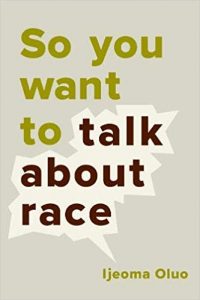We asked Erika Washburn to share her reflections from our book discussion event. Erika has been a member of WA Women’s Foundation since 2011 and has served on the Pooled Fund Grant Committee (Education, Environment, and Health).
“It is a book we need to discuss. We can’t just read it.” – Attendee
“The book plowed the ground and stirred things up.” – Attendee
I joined the multi-racial group of Washington Women’s Foundation members and guests who met one evening in March to discuss our Member Engagement Committee’s annual book selection, So You Want to Talk About Race, by Ijeoma Oluo. A New York Times best-seller, So You Want to Talk About Race is Ijeoma Oluo’s personal reflections on race in America and covers subjects ranging from intersectionality and affirmative action to “model minorities” and microagressions.

Facilitators Sarah Tran and Angela Powell set the stage for an open, honest, and sometimes vulnerable discussion by setting “ground rules” for the evening that ensured an intimate discussion about a sensitive topic:
- Listen to learn. Listen to understand. That will require we all have a chance to speak.
- Step up and step back. Be aware of dynamics in the room. Make sure there is space for everyone to share ideas, wonderings. Push yourself a little bit while allowing others their space.
- Don’t interrupt others.
- Speak for yourself and use “I” statements.
- Be thoughtful about power dynamics. Age, race, class, religion. There is a ranking of identities in our society. Power dynamics exist whether we like it or not. Be thoughtful about dynamics in play.
- Experience discomfort and stay engaged. Embrace discomfort. It’s normal.
- Accept and expect non-closure. We won’t solve racism today. Continue to think about these things and challenge yourself.
- Confidentiality – leave here today with a gem or someone’s story but don’t repeat personal details. Stories are a gift.
We discussed openly and candidly our reactions to the book and then shared our own experiences with racism and privilege. We also explored the concepts of entitlement, oppression, shame, guilt, complicity, anger, justice, accountability, power, relentlessness, courage, intersectionality, and systemic change.
The group listened and learned from one another about cultural assumptions, missteps, violations, and personal perspectives on racism today. Community was established as we appreciated the opportunity to discuss the raw content of the book, admit the injustices humanity commits, and ask what we can do to make a difference. In small groups, we offered personal reflections of experiences with racism and fumbled attempts at repair as we explored the following questions posed by our facilitators:
- What was your initial reaction to the book? What questions arose for you, or what issues do you most want to explore?”
- Why do you think the author felt it was important to talk about privilege before talking about intersectionality? How did it influence your approach to how you understand and navigate your own intersectionality?
- What are some of the ways in which the author discusses different roles that white people and people of color play in fighting systemic racism in our society?
- What are some of the racial microaggressions that you have encountered, witnessed, or experienced? What are some that you may have perpetrated on others? How has your thinking evolved on the impact they have?
- Where do you see tone policing happen in your life, in the media, at Washington Women’s Foundation or in your workplace?
- What is the difference between calling out microaggressions and tone policing?
As the discussion evolved, it became clear that everyone present had a passion and motivation for making change happen individually and collectively at Washington Women’s Foundation. We discussed how making change happen internally at the Foundation will require us to shift who gets to feel “comfortable” in discussions at the Foundation.
“If the goal is to be able to share one’s truth as a woman of color and have it heard, not invalidated or contested or showered with guilt, then why is it, we see the goal as comfort? The goal is not to move from discomfort to comfort. The goal is acknowledging the world and the systems within it need to be changing.” – Attendee
We left the group discussion having a new shared understanding of our individual and collective responsibility to help dismantle systems that perpetuate inequality and racism.
If some of the terms in the questions above are unfamiliar to you, then I encourage you to read So You Want to Talk About Race. Invite another member to read it with you, and then explore these questions together. I now understand that this process starts with a conversation. I am committed to engaging in a conversation, and I hope you’ll join me.
“Listen. Grow. Evolve. Change. If we stay in fear about not talking to each other, nothing is going to change. It will end up destroying us.” – Attendee
I also now know, however, that this process doesn’t stop with a conversation. As Ijeoma Olou clearly illustrates in every chapter of her book, we aren’t just dealing with individual acts of oppression or racism. Instead, we also are wrestling with systemic racism that has been built over the course of many generations. Those of us with privilege can use that privilege to challenge and change those systems.
“We are the system. Each one of us is part of the system. When you go to the PTA meeting, the board meeting, you can change the dynamic. It starts on the day-to-day level.” – Attendee
So I encourage you to think about what steps you can take after reading the book and having a conversation. What’s your action plan for disrupting systemic racism? If the problem feels to big, then take to heart Ms. Olou’s advice – to find “your little piece of the system you can dismantle,” and work on dismantling racism piece by piece. This effort needs all of us.